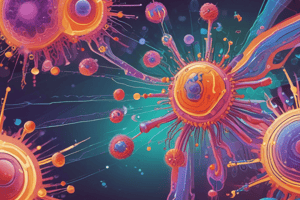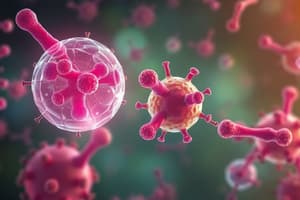Podcast
Questions and Answers
What is the primary difference between an antigen and an antibody?
What is the primary difference between an antigen and an antibody?
- An antigen is a type of white blood cell, while an antibody is a toxin.
- An antigen stimulates an immune response, while an antibody is produced in response to an antigen. (correct)
- An antibody binds to bacteria, while an antigen binds to viruses.
- Antigens are produced by the body, but antibodies are not.
What is immunity?
What is immunity?
The ability of an organism to resist a particular infection or toxin by the action of specific antibodies or sensitized white blood cells.
Differentiate between agglutination, opsonization, and neutralization.
Differentiate between agglutination, opsonization, and neutralization.
Agglutination enhances phagocytosis; opsonization coats antigens with antibodies to enhance phagocytosis; neutralization blocks adhesion of bacteria and viruses.
Which of the following are the 4 main types of T cells?
Which of the following are the 4 main types of T cells?
Why does the immune system not react to the body's own cells?
Why does the immune system not react to the body's own cells?
What is the function of MHC (Major Histocompatibility Complex) molecules?
What is the function of MHC (Major Histocompatibility Complex) molecules?
How do plasma cells and memory B cells differ?
How do plasma cells and memory B cells differ?
Explain the Clonal Selection Theory as it applies to B cells.
Explain the Clonal Selection Theory as it applies to B cells.
How is a T cell activated by a macrophage?
How is a T cell activated by a macrophage?
Describe the primary and secondary immune response of IgG to a vaccine.
Describe the primary and secondary immune response of IgG to a vaccine.
Differentiate between antibody-mediated immunity (humoral immunity) and cell-mediated immunity.
Differentiate between antibody-mediated immunity (humoral immunity) and cell-mediated immunity.
Flashcards are hidden until you start studying
Study Notes
Antigens and Antibodies
- Antigens stimulate an immune response.
- Antibodies are proteins created in response to antigens.
- Antibodies specifically recognize and bind to their corresponding antigens.
Immunity
- Refers to an organism's ability to resist specific infections or toxins.
- Involves actions by particular antibodies or sensitized white blood cells.
Protective Mechanisms of Antibodies
- Agglutination: Antibodies bind to multiple antigens, enhancing phagocytosis and reducing infectious units.
- Opsonization: Antibodies coat antigens, facilitating their recognition and uptake by phagocytes.
- Neutralization: Antibodies block pathogens from adhering to host cells and prevent toxin activity.
Types of T Cells
- Helper T cells: Assist other immune cells.
- Cytotoxic T cells: Target and kill infected cells.
- Memory T cells: Provide a rapid response upon re-exposure to an antigen.
- Suppressor T cells: Regulate the immune response to prevent overactivity.
Immune Tolerance
- The immune system distinguishes between self and foreign cells using specific antigens.
- Self-recognition prevents the immune attack on the body’s own cells.
Major Histocompatibility Complex (MHC)
- MHC molecules display peptide fragments from pathogens on infected cells.
- Essential for T cell recognition and activation within the adaptive immune system.
B Cells: Plasma vs. Memory
- Plasma cells are differentiated B cells producing initial antibodies against infection.
- Memory B cells are created by further differentiation for prolonged immunity to previously encountered pathogens.
Clonal Selection Theory
- Explains the rapid immune response to subsequent exposures to a pathogen.
- B cells can clone themselves and differentiate into plasma or memory cells for effective response.
T Cell Activation Process
- Requires antigen-presenting cells like macrophages or B cells displaying antigens on MHC proteins.
- Helper T cells are activated upon recognizing specific antigens; memory T cells enable quick responses to re-exposure.
Immune Responses to Vaccination
- Primary response: Initial exposure to a vaccine leads to no immediate antibody production while B cells are activated.
- Secondary response: Occurs upon later exposure when memory B cells facilitate a quicker and more robust antibody response.
Types of Immunity
- Humoral Immunity (Antibody-mediated): Involves B cells producing antibodies after encountering an antigen, assisted by helper T cells.
- Cell-mediated Immunity: Targets pathogens that invade host cells, acting through T cells and other immune mechanisms.
Studying That Suits You
Use AI to generate personalized quizzes and flashcards to suit your learning preferences.




